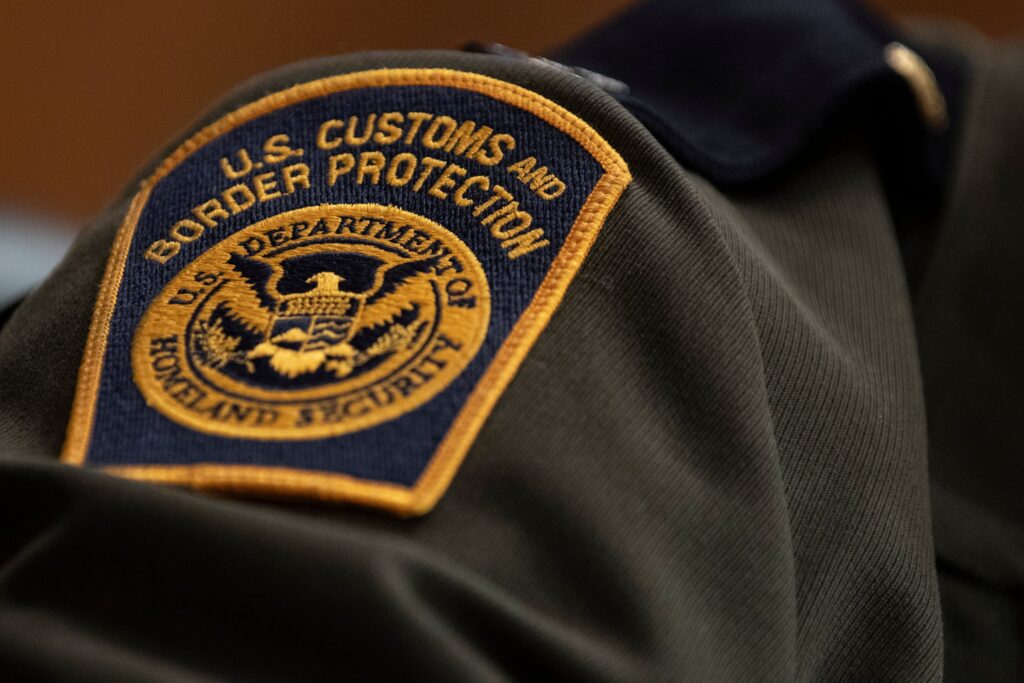Christopher Frison, chief maintenance engineer at the Residence Inn by Marriott in North Portland, went to unclog the toilet in Room 428 about 5 p.m. on July 27, 2020.
He said he knocked several times, called out “maintenance,” gave his name and then waited.
What happened next became the subject of hotly debated testimony Wednesday as a federal judge heard much different versions from Frison and the hotel guest, a U.S. Customs and Border Protection agent.
Frison sued the U.S. government, alleging federal agent Joshua Allan Jones engaged in civil assault while on duty. He’s seeking unspecified damages.
Jones was part of a Phoenix-based
Border Patrol tactical unit sent to Portland
to defend the federal courthouse and other federal buildings during nightly protests and unrest following the police killing of George Floyd in Minneapolis.
According to Frison, Jones was wearing a
sweatshirt with the hood pulled
over his head when he “swung” the hotel door open, reached with his right hand behind his back and suddenly pointed a handgun at Frison’s chest. He said Jones held his gun in two hands, both arms outstretched.
“What the hell are you doing? What is going on?” Frison said he screamed. “All I could see was the white of his eyes. I could see the anger in his face. I wasn’t there as a threat. I was there as a maintenance worker.”
Frison said Jones pointed the gun at him for 4 to 5 seconds before uttering twice that he “f—– up.”
Jones then turned to the side, removed a magazine from the gun and appeared to put the gun on the floor behind the door, Frison said.
Jones then asked him to come inside the room, Frison said.
Frison refused to enter the room and instead handed the plunger to Jones and left, he said.
Frison went down the hotel stairwell to the front desk to get Jones’ name and wrote a letter to his boss two days later about what happened, he testified.
“I felt very threatened,” said Frison, now 65. “He could have killed me for no reason.”
Jones testified that he never pointed his gun at Frison and only held it in his right hand, down to his side with the barrel pointed at the floor. He said he likely held his H&K P2000 SK 9mm handgun that has a shorter barrel, which the agency no longer uses.
Jones said he was getting his gear ready after using the room phone earlier to call for maintenance. When he heard the knock about 20 minutes later, it didn’t occur to him that it was a maintenance worker responding, he said.
In an email that a supervisor had him write a few days later in response to Frison’s complaint, Jones said he assumed one of his teammates might be at the door and answered holding a gun in his right hand, which hung straight down by his side with the barrel pointed at the floor.
Border patrol tactical agent Joshua Jones wrote this email at his supervisor’s direction in response to a complaint from hotel worker Christopher Frison in July 2020.
Court record
But during a deposition taken in the civil case in 2022, Jones said he thought a protester might have been outside his hotel room door. “It crossed my mind,” he testified then.
Asked by Frison’s lawyer Nathan Haberman-Ducey about the discrepancy while on the witness stand Wednesday, Jones acknowledged the differences and said, “My teammates seemed the most likely, but I didn’t have any reason to expect them.”
He conceded that he had some suspicion that a protester could have tracked him to the hotel room and that “there was potential for that.”
He also said he was prepared “to protect that room” and to defend himself.
Yet he said he never looked in the peephole of the room door before opening it and didn’t remember if the gun in his hand was loaded.
U.S. District Judge Adrienne Nelson said she would issue her verdict later but didn’t give a timeline.
Aside from Frison and Jones, Frison’s lawyers called a firearms instructor, William McKnight, a former lawyer who instructs officers in Washington and Oregon.
McKnight said he could understand why a federal agent that summer might worry that an anti-fascist protester might show up at his hotel and that he would take his duty weapon with him when opening the door.
“It was an insane time, and he had every reason to be somewhat in fear — head on a swivel, 100%,” McKnight testified.
Jones, now 44, said he fired less-lethal munitions during the “chaotic” Portland protests outside the federal courthouse and had all types of hard objects thrown at him by protesters, gas canisters lobbed back at him as well as lasers shined in his eyes. He worked in Portland from July 22 to Aug. 3 in 2020 and has been a Border Patrol agent since 2012.
But McKnight found Jones’ account of how he held his gun unbelievable and said he doubted Jones wouldn’t know whether his gun was loaded.
Holding his handgun down at his side – what’s called “dangling” — is unprofessional and “generally forbidden,” McKnight testified, adding that such a tactic likely would have provoked ribbing by his trained colleagues.
Officers are trained to know if their duty weapons are loaded, McKnight testified, and it wouldn’t make sense for Jones to have carried an unloaded gun to the door if he perceived any potential threat.
“You always know the status of your gun,” McKnight said.
Assistant U.S. Attorney Patrick Conti argued that McKnight wasn’t familiar with the training of federal law enforcement officers. Under questioning later, Jones described his stance as holding the gun in what’s known as a “low ready” position.
Conti also sought to discredit McKnight by getting him to acknowledge that he had relinquished his law license about 30 years ago when the Oregon State Bar found he had retained clients’ fees paid for services not rendered.
McKnight was admitted to the state bar in 1986 but submitted a resignation and was functionally disbarred in September 1997, according to Kateri Walsh, state bar spokesperson.
In his closing argument, attorney Michael Fuller, also representing Frison, urged the judge to rely on McKnight and find it more likely than not that Frison’s account of what occurred is what actually took place and hold the government liable for agent Jones’ alleged civil assault against Frison.
He urged the judge to contrast Frison’s testimony with the account of Jones, who wasn’t sure if his gun was loaded and gave different reasons for taking the gun to the door.
Joshua Keller, another government lawyer, argued that Frison’s recollection of events “is not realistic,” saying it wouldn’t make sense for Jones to open his hotel door, then reach for his gun and point it at Jones. Frison’s description of Jones standing with arms outstretched, holding a gun with both his hands, could have been drawn from any action movie, TV show or Youtube video and wasn’t more credible than Jones’ testimony, Keller told the judge.
He said Jones had no intent to harm anyone on the other side of the door and it wasn’t unusual for the agent to hold the gun down in his hand.
Without any intent to harm Frison, the agent and the government can’t be held liable for assault, Keller said. If so, any law enforcement officer would be subject to liability “just by having the gun in their hand or in a holster,” he argued.
Fuller countered that he didn’t have to prove the agent intended to harm Frison, only that Jones’ actions caused Frison to reasonably believe he was about to be harmed.
— Maxine Bernstein covers federal court and criminal justice. Reach her at 503-221-8212, mbernstein@oregonian.com, follow her on X
@maxoregonian
, on Bluesky
@maxbernstein.bsky.social
or on
LinkedIn
.
Stories by
Maxine Bernstein
-
Former Oregon doctor can plead Fifth in suit by dozens of patients alleging abuse, judge rules
-
Man accused of hauling 270 pounds of meth from California to Oregon
-
Judge to decide if ex-West Linn doctor must answer questions in sex abuse lawsuit
-
Anguished mother demands lawyers use her son’s name instead of describing him only as heroin OD victim
-
Police captain in Oregon on leave amid illegal hunting probe




More Stories
Portland hotel worker testifies border patrol agent pointed gun at him in 2020
Portland hotel worker testifies border patrol agent pointed gun at him in 2020
Portland hotel worker testifies border patrol agent pointed gun at him in 2020